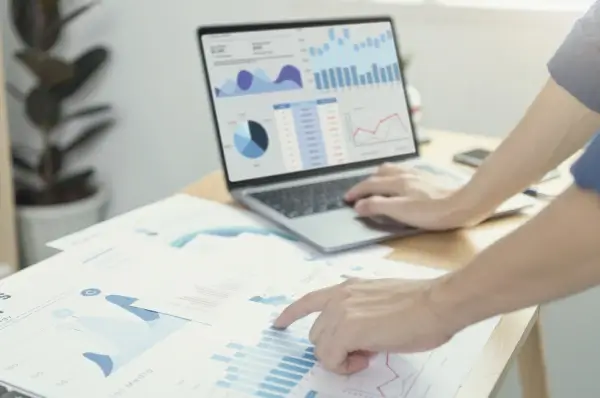Overview
As 2025 draws near, the accounting industry is seeing a tremendous shift, driven by technological breakthroughs and evolving customer expectations. In this blog, we’ll look at the top accounting trends poised to dominate the industry, investigating how these developments will not only revolutionize traditional accounting processes but also reshape the future of financial management.
Ready to learn the breakthroughs that will define the next era of accounting?
AI and Machine Learning: Automation Reaching New Heights
Artificial intelligence (AI) and machine learning are set to revolutionize accounting by automating not only routine tasks but also complex decision-making processes. In 2025, these technologies will allow accountants to streamline tasks such as data entry, reconciliations, and even tax preparation. However, AI’s reach will extend beyond automation. It will provide accountants with predictive insights, enabling them to offer more accurate financial forecasting, fraud detection, and enhanced advisory services.
With AI doing the heavy lifting, accountants will spend less time on manual processes and more time analyzing data and advising clients based on real-time insights. This shift will help firms improve their efficiency and focus on providing strategic business advice rather than simply managing financial transactions.
Blockchain: Enhancing Trust and Transparency
By 2025, blockchain is expected to make deeper inroads into accounting, offering a secure, transparent, and immutable system for recording transactions. This technology is particularly valuable for auditing, financial reporting, and fraud prevention, as it creates tamper-proof records that allow auditors to verify data with complete confidence, reducing the need for manual checks.
Enterprise Resource Planning (ERP) Systems: Seamless Integration and Automation
Enterprise Resource Planning (ERP) systems have long been a staple in large businesses, but by 2025, their adoption will extend to small and mid-sized companies as well. For accountants, ERP systems mean greater integration and access to real-time data. Instead of working in silos, accounting teams will collaborate more closely with other departments, as all financial and operational data is housed in one place. ERP systems will also leverage AI to automate complex financial processes, such as budgeting and forecasting, reducing manual workloads and improving efficiency.
Cybersecurity and Data Protection: Safeguarding Financial Information
As accountants increasingly rely on digital tools and cloud-based platforms, cybersecurity and data protection will become a critical focus in 2025. The accounting industry, with its access to sensitive financial information, is a prime target for cyberattacks. Ensuring that client data is protected from breaches and fraud is not only a compliance issue but also essential for maintaining trust.
In 2025, accountants will need to be well-versed in cybersecurity best practices and data protection regulations, such as GDPR and CCPA. Accounting software and ERP systems will incorporate more robust encryption, multi-factor authentication, and AI-driven threat detection to prevent data breaches. As cyber threats become more sophisticated, accounting firms must invest in cybersecurity technologies and employee training to mitigate risks. Firms that can demonstrate strong data protection measures will have a competitive advantage in building trust with their clients.
Autonomous Accounting Systems: Reducing Manual Work
Another transformative trend for 2025 is the rise of autonomous accounting systems. These systems leverage AI and machine learning to streamline accounts payable and receivable processes, automate payroll, and even handle tax compliance. By reducing manual workloads, these systems allow accountants to focus on higher-level tasks such as financial analysis, strategy, and client advisory services.
Cloud Accounting: Collaboration and Scalability
Cloud-based accounting solutions will continue to dominate the accounting landscape in 2025. As more businesses adopt remote and hybrid work models, cloud accounting platforms offer the flexibility to access real-time financial data from anywhere. These platforms provide scalability for growing businesses, allowing them to add new functionalities and integrate with other software systems like CRM and ERP platforms seamlessly.
For accountants, cloud-based systems offer improved collaboration with clients and team members, real-time data updates, and easier compliance management. As cloud technology evolves, it will also offer advanced features such as AI-driven analytics and enhanced data security.
Data Analytics and Predictive Insights
In 2025, data analytics will move to the forefront of accounting as companies generate and analyze vast amounts of financial data. Accountants will leverage advanced analytics tools to provide predictive insights, helping businesses make data-driven decisions. Predictive analytics will allow firms to forecast financial trends, anticipate cash flow problems, and identify growth opportunities. To stay competitive, accountants will need to enhance their data analysis skills.
Sustainability and ESG Reporting
By 2025, Environmental, Social, and Governance (ESG) reporting will become a key component of financial reporting, driven by growing investor, regulator, and consumer focus on sustainability and corporate governance. Accountants will be essential in collecting, analyzing, and reporting ESG data to meet these demands. Firms that emphasize ESG transparency will attract investors and comply with regulations more effectively. To stay competitive, accountants must integrate ESG metrics into financial reports and ensure the accuracy and reliability of this data.
The Accountant’s Role is Evolving: From Number Crunchers to Strategic Advisors
Perhaps the most significant trend for 2025 is the evolving role of the accountant. Technology, automation, and data analytics will reduce the need for accountants to perform manual tasks, freeing up time for higher-level strategic thinking. Accountants will increasingly take on the role of strategic advisors, using insights derived from data to guide decision-making.
As businesses rely more on real-time financial information, the ability to interpret this data and provide actionable recommendations will become a valuable skill set. Accountants must embrace continuous learning, stay updated on technological advancements, and refine their analytical skills to remain relevant in this dynamic landscape.

Conclusion
As we look ahead to 2025, the accounting profession is on the verge of a transformational age. Embracing technology is no longer an option—it is required for those who want to stay ahead of the curve. Accountants of the future will be more than just number crunchers; they’ll be strategic consultants, employing cutting-edge tools to uncover deeper insights and help firms through an increasingly dynamic and complex landscape. Accounting
professionals can provide exceptional value by leveraging automation, AI, and data analytics, empowering clients to thrive. The future is bright for those committed to innovating, adapting, and leading the path into the next era of accounting.



